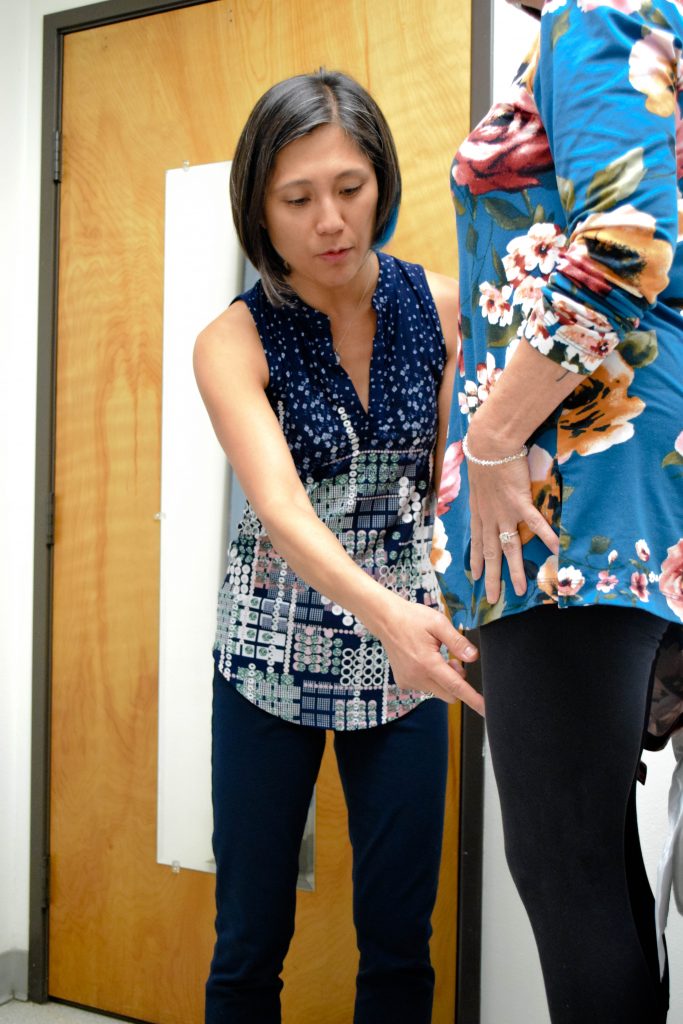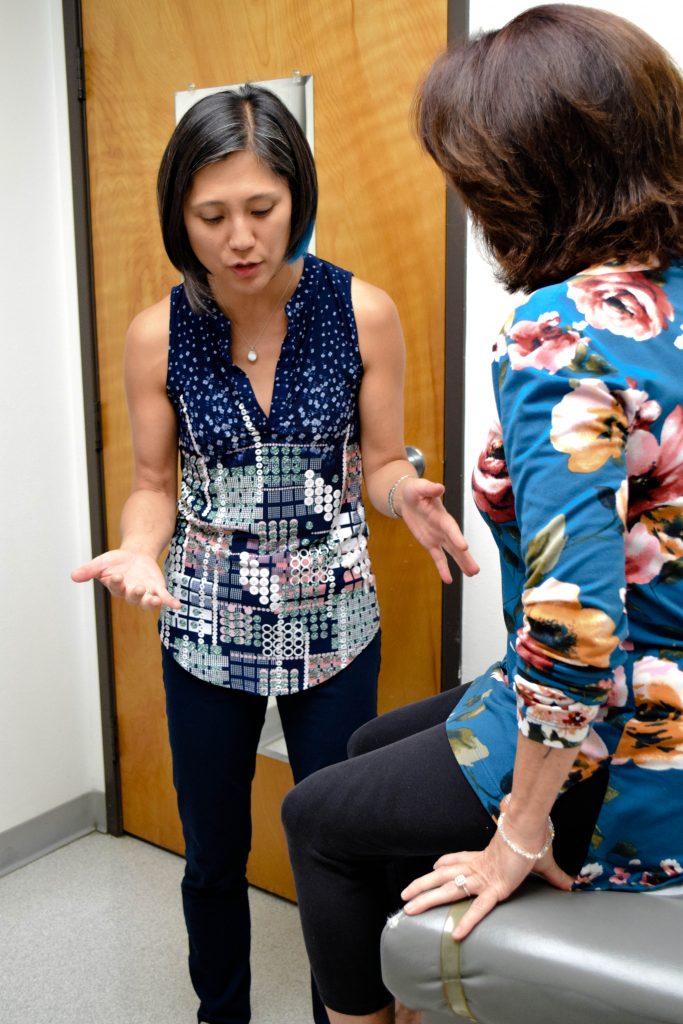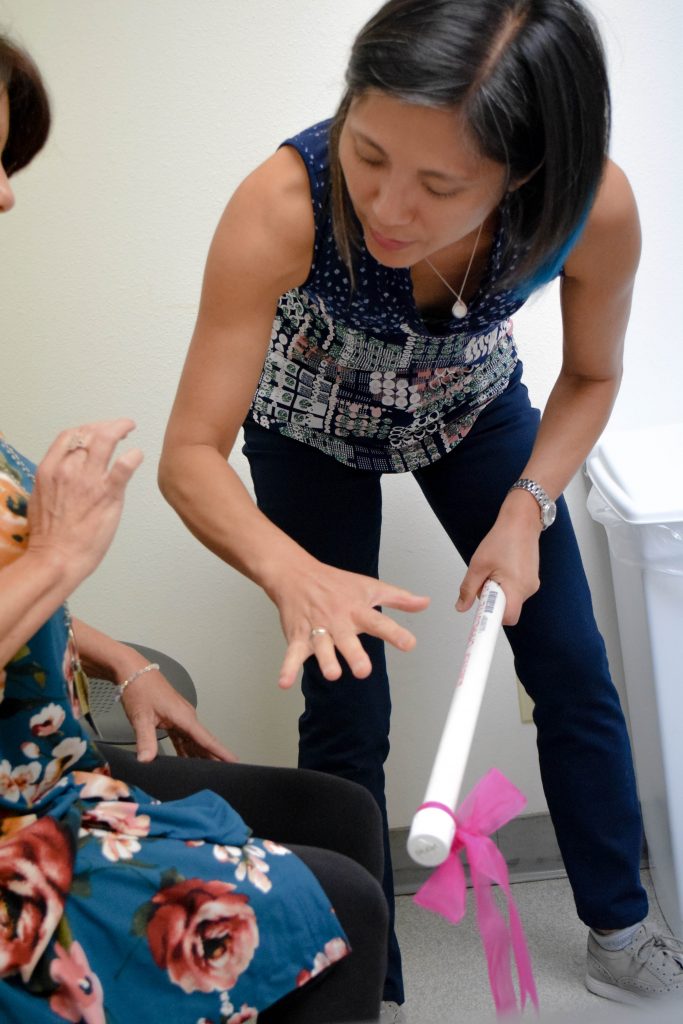I met Dr. Kim at Harvard Medical School’s CME publishing course a few years ago. I was immediately struck by her assertion that the most damaging thing we do to our bodies as writers is not sitting but getting into and out of our chairs — perhaps a hundred times a day.

Dr. Kim was trained conventionally in family medicine. An injury of her own, set her down the course of understanding the deeper sources of pain once the bone in her wrist had healed. Dr. Kim began studying functional medicine and became especially curious about the fascia, the connective tissue, and how the way we use (or mis-use) our hips in coming to a sitting or standing position can impact our bodies from our toes to our necks and heads.
Connecting the Dots
I immediately thought this information important for writers who transition from sitting to standing and standing to sitting throughout the day.

Dr. Kim and I stayed loosely in touch. Shortly after a book concept consultation with me, Dr. Kim traveled East from California to Boston for a medical conference. We agreed to meet so she could teach me about her system and I could get more of a sense of the book she’s working on.
The day we met, I felt particularly exhausted and uncomfortable. After our two hour meeting, I came home energized and no longer in pain. I began watching her free youtube videos and practicing the homework. I was amazed. I have not had a single day where I felt that deep fatigue and pain again.
I could not wait until her book is written and published to share this powerful free training with my readers!
What We Writers Can Learn from Dr. Kim About Sitting / Standing Transitions

When my colleague Dan Thibeault from Fast Twitch Media offered his new digital media platform for an author interview I immediately realized this was the opportunity to share Dr. Kim’s work with my writers community. From our interview you’ll learn habits to improve overall health and wellbeing, as well as a few great writing tips!
In our interview you’ll learn:

- The #1 most health-defeating thing we writers do about 100 times a day
- How to undo that #1 health-defeater and shift your mechanics to get out of pain.
- Why going to the gym is wasteful if you’re still doing the #1 health-defeater.
- How to “make life your gym instead.”
- Why Dr. Kim asserts that, “The Fountain of Youth is in Your Thighs.”
- How sitting affects our creative flow–negatively or positively.
In addition, I think you’ll delight in Dr. Kim’s masterful metaphors! I hope you’ll enjoy our interview on a Writer’s Guide to Sitting (and much more!)
About Cathy Kim, MD
Dr. Cathy Kim is a Body Function Specialist who has evolved her 20+ years of experience in primary care into an integrative and functionalist style to address varied health problems, many of which have a common link. By focusing on the fundamentals of diet and biomechanics, Dr. Kim offers comprehensive advice about lifestyle and mindful movement to help her patients reclaim and preserve vitality without medications.
Check out Dr. Kim’s FREE instruction on YouTube (and feel free to subscribe, so you never miss a video!).



Cathy, I received a question by email:
“I watched the two vids and have a question – how does a person stand by stretching their arms straight out in front of the computer, while bending forward to stand? My computer is on a high drawing board (from Art school in my 20’s), so I sit on a high chair without my feet on the floor.”
Hmmmmm, let me see if I can clarify a few points:
1) In general, I have people turn ~90deg away from their desk, so that they can bend freely at their hip to get up without worrying about “running into” their actual desk
2) when bending over, you can let your arms dangle by the head, which helps your teeter-totter (your back) tip so that your tush can lift off of the chair more easily (if you keep your hands back towards your hips like getting ready to dive, it makes it harder to lift your butt)
3) it is hard to say without seeing the set up, but in general, I have found that the mechanics of using a high chair detrimental over time because it stiffens and/or shortens the thigh muscles because
a) pushing off the forefoot/toes to get in and out of the chair
b) thighs are usually “sloping” from the hip to the knee, so they are even less passively stretched than with regular chair sitting when the thighs are parallel to the floor (think “tight jeans”)
Hope this helps, ~Dr. Kim
Great to read this article learnt a lot !